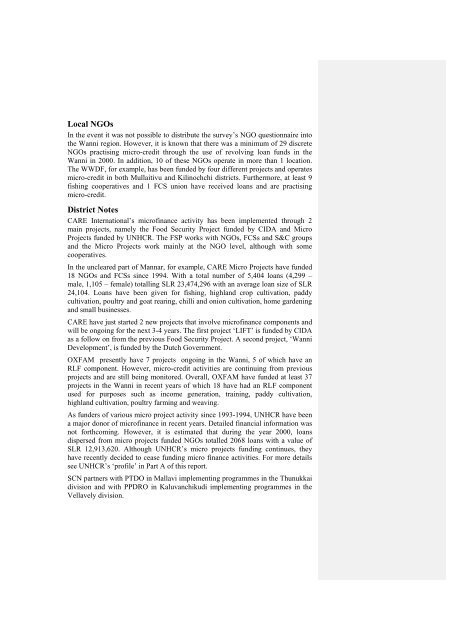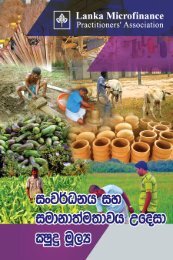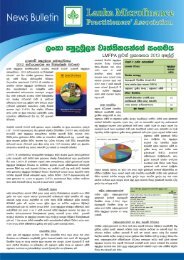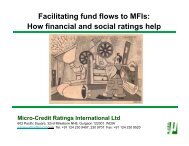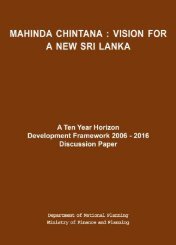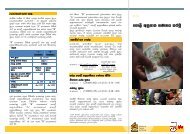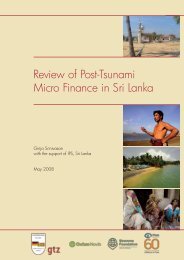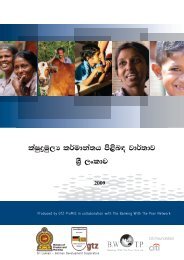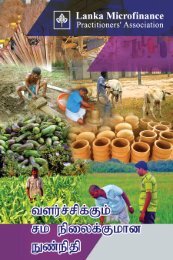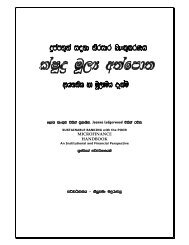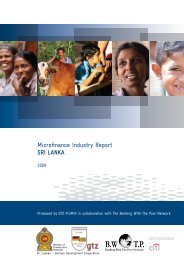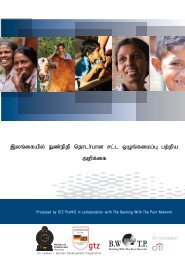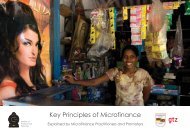National Microfinance Study of Sri Lanka: Survey of Practices and ...
National Microfinance Study of Sri Lanka: Survey of Practices and ...
National Microfinance Study of Sri Lanka: Survey of Practices and ...
Create successful ePaper yourself
Turn your PDF publications into a flip-book with our unique Google optimized e-Paper software.
Local NGOs<br />
In the event it was not possible to distribute the survey’s NGO questionnaire into<br />
the Wanni region. However, it is known that there was a minimum <strong>of</strong> 29 discrete<br />
NGOs practising micro-credit through the use <strong>of</strong> revolving loan funds in the<br />
Wanni in 2000. In addition, 10 <strong>of</strong> these NGOs operate in more than 1 location.<br />
The WWDF, for example, has been funded by four different projects <strong>and</strong> operates<br />
micro-credit in both Mullaitivu <strong>and</strong> Kilinochchi districts. Furthermore, at least 9<br />
fishing cooperatives <strong>and</strong> 1 FCS union have received loans <strong>and</strong> are practising<br />
micro-credit.<br />
District Notes<br />
CARE International’s micr<strong>of</strong>inance activity has been implemented through 2<br />
main projects, namely the Food Security Project funded by CIDA <strong>and</strong> Micro<br />
Projects funded by UNHCR. The FSP works with NGOs, FCSs <strong>and</strong> S&C groups<br />
<strong>and</strong> the Micro Projects work mainly at the NGO level, although with some<br />
cooperatives.<br />
In the uncleared part <strong>of</strong> Mannar, for example, CARE Micro Projects have funded<br />
18 NGOs <strong>and</strong> FCSs since 1994. With a total number <strong>of</strong> 5,404 loans (4,299 –<br />
male, 1,105 – female) totalling SLR 23,474,296 with an average loan size <strong>of</strong> SLR<br />
24,104. Loans have been given for fishing, highl<strong>and</strong> crop cultivation, paddy<br />
cultivation, poultry <strong>and</strong> goat rearing, chilli <strong>and</strong> onion cultivation, home gardening<br />
<strong>and</strong> small businesses.<br />
CARE have just started 2 new projects that involve micr<strong>of</strong>inance components <strong>and</strong><br />
will be ongoing for the next 3-4 years. The first project ‘LIFT’ is funded by CIDA<br />
as a follow on from the previous Food Security Project. A second project, ‘Wanni<br />
Development’, is funded by the Dutch Government.<br />
OXFAM presently have 7 projects ongoing in the Wanni, 5 <strong>of</strong> which have an<br />
RLF component. However, micro-credit activities are continuing from previous<br />
projects <strong>and</strong> are still being monitored. Overall, OXFAM have funded at least 37<br />
projects in the Wanni in recent years <strong>of</strong> which 18 have had an RLF component<br />
used for purposes such as income generation, training, paddy cultivation,<br />
highl<strong>and</strong> cultivation, poultry farming <strong>and</strong> weaving.<br />
As funders <strong>of</strong> various micro project activity since 1993-1994, UNHCR have been<br />
a major donor <strong>of</strong> micr<strong>of</strong>inance in recent years. Detailed financial information was<br />
not forthcoming. However, it is estimated that during the year 2000, loans<br />
dispersed from micro projects funded NGOs totalled 2068 loans with a value <strong>of</strong><br />
SLR 12,913,620. Although UNHCR’s micro projects funding continues, they<br />
have recently decided to cease funding micro finance activities. For more details<br />
see UNHCR’s ‘pr<strong>of</strong>ile’ in Part A <strong>of</strong> this report.<br />
SCN partners with PTDO in Mallavi implementing programmes in the Thunukkai<br />
division <strong>and</strong> with PPDRO in Kaluvanchikudi implementing programmes in the<br />
Vellavely division.


